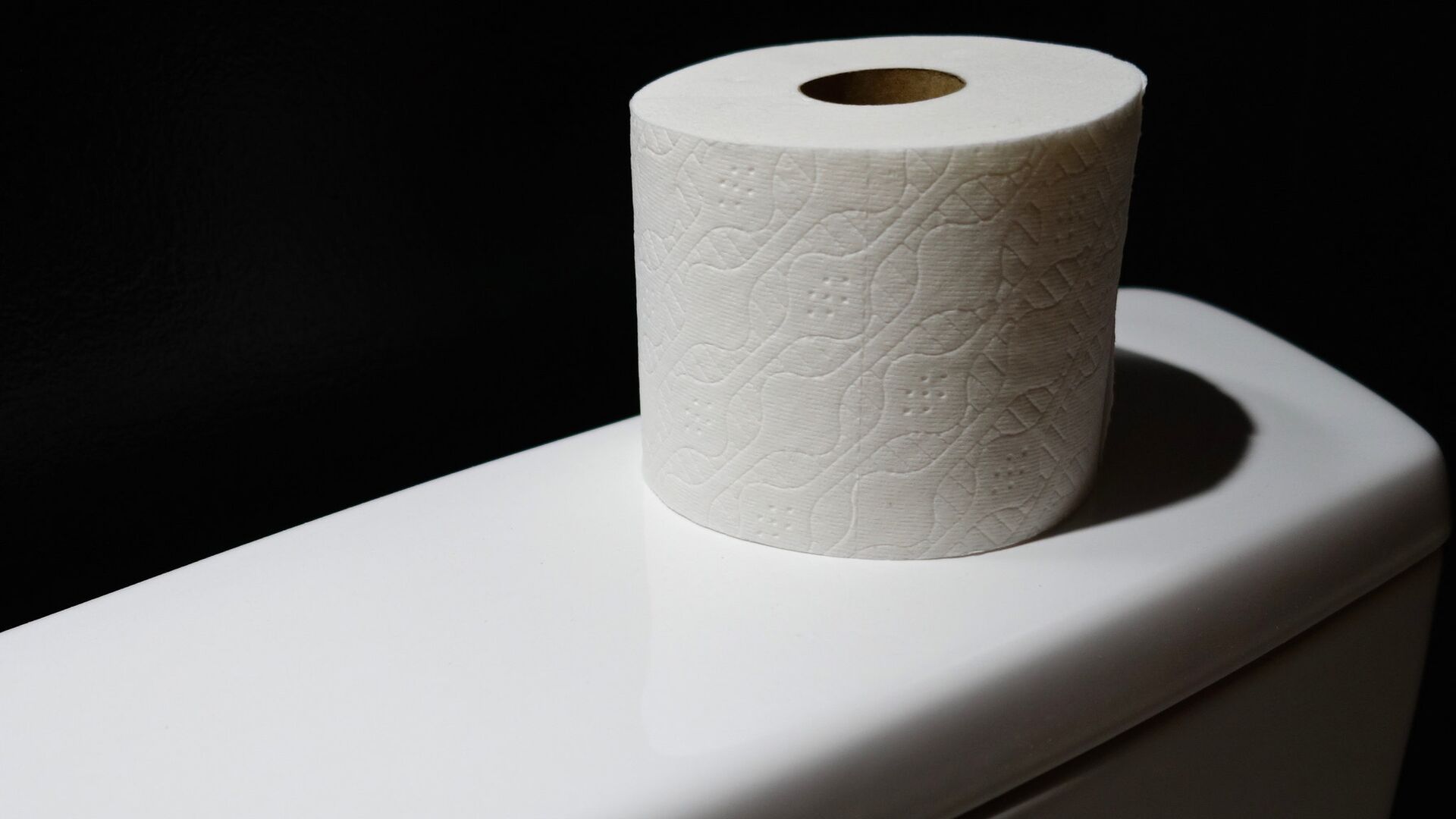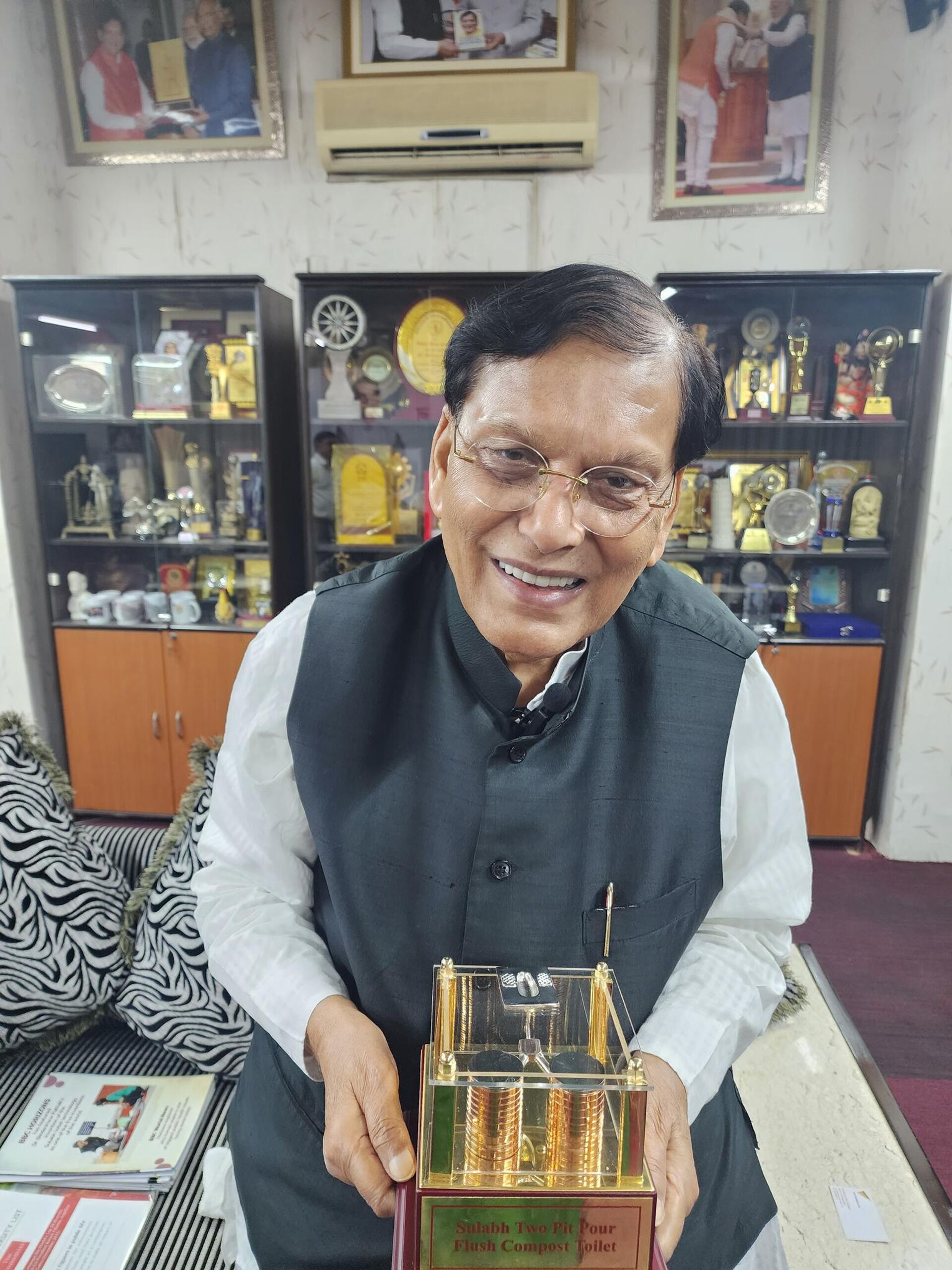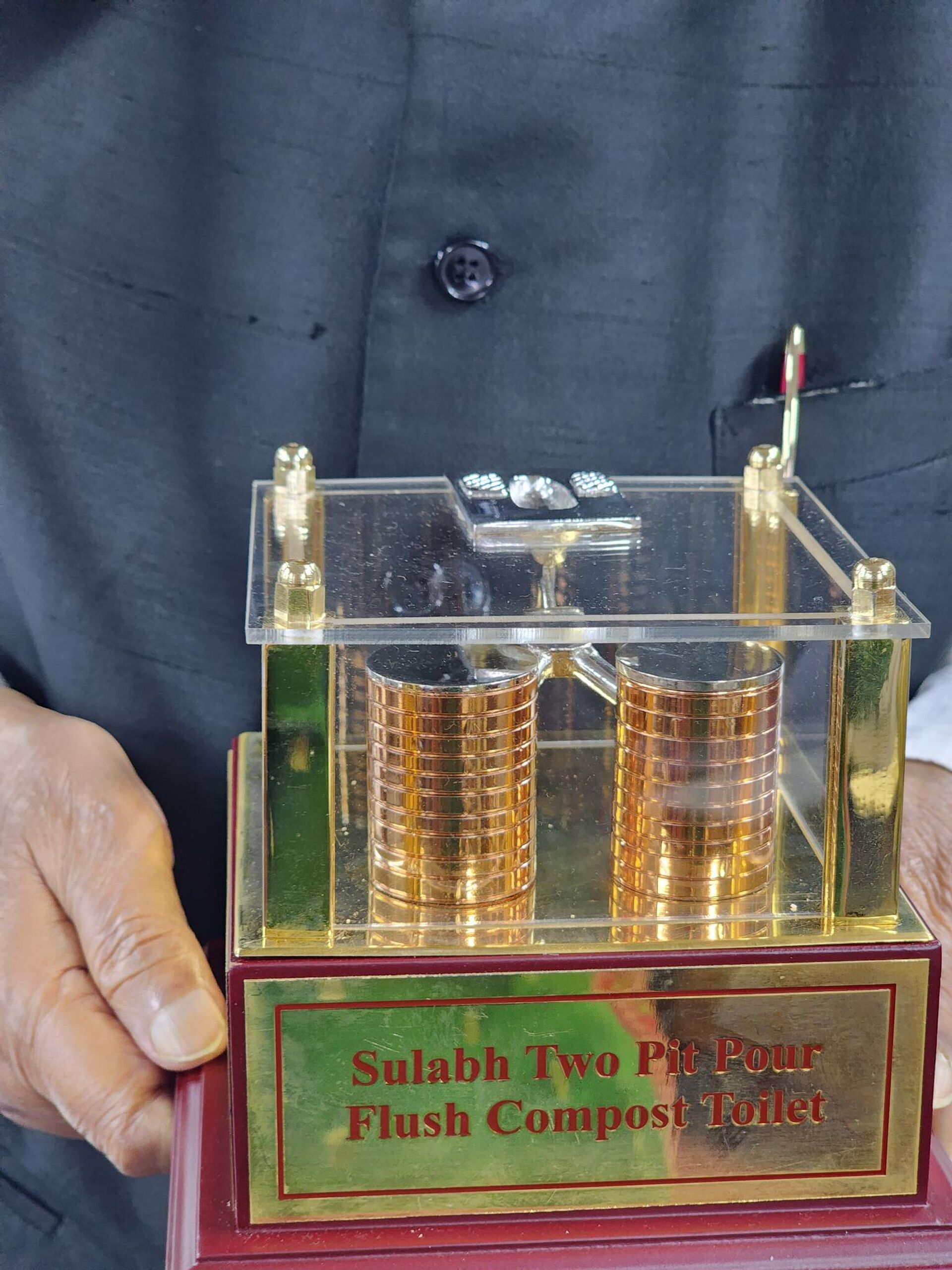https://sputnikglobe.com/20221119/world-toilet-day-meet-dr-bindeshwar-pathak-man-who-brought-sanitation-revolution-to-india-1104429607.html
World Toilet Day: Meet Dr. Bindeshwar Pathak, Man Who Brought Sanitation Revolution to India
World Toilet Day: Meet Dr. Bindeshwar Pathak, Man Who Brought Sanitation Revolution to India
Sputnik International
Every year on November 19, World Toilet Day is celebrated to draw attention worldwide to the global sanitation crisis and help achieve Sustainable Development... 19.11.2022, Sputnik International
2022-11-19T15:24+0000
2022-11-19T15:24+0000
2022-11-19T15:28+0000
india
toilet
toilet revolution
toilets
sanitation
hygiene
hygiene
cholera
cholera
cholera outbreak
https://cdn1.img.sputnikglobe.com/img/103495/89/1034958935_0:88:2049:1240_1920x0_80_0_0_b8ef11948443cc866db168e9006f20ec.jpg
A report published in 2020 by UNICEF and WHO revealed that the world is alarmingly off-track on providing sanitation for everyone by 2030. Moreover, despite progress, over half of the world’s population, some 4.2 billion people, uses sanitation services that leave human waste untreated, threatening human and environmental health.An estimated 673 million people across the world still have no toilets at all and practice open defecation, while nearly 698 million school-age children lack basic sanitation services at their schools.To tackle the sanitation crisis in India, Dr. Bindeshwar Pathak, 79, the founder of Sulabh International, a social service organization that among other things works on environmental sanitation promotion, started a major revolution in 1968 in the movement towards sanitation.From eradicating human scavengers, who were treated as untouchables in India, to developing sustainable and environmentally friendly toilets and giving people access to water, sanitation, and hygiene, Dr. Pathak dedicated his entire life to working for this social cause, for which he was awarded the country’s highest civilian honor – Padma Bhushan – in 1991.Walking the Path of Mahatma GandhiDr. Pathak’s journey took a big turn after he decided follow in the path of Mahatma Gandhi’s ideologies for a clean India and the eradication of the social stigma of untouchability.In 1968, Dr. Pathak joined the Gandhi Centenary Committee in Bihar state and was working in the Bhangi-Mukti (Scavengers Liberation) Cell. He was asked by the general secretary of the committee to fulfill Gandhi's vision to eradicate untouchability and human scavenging.Dr. Pathak told Sputnik that this wasn’t easy for him, as he belonged to the Brahmin (upper) caste and at the time, even talking about toilets was taboo.Dr. Pathak went and lived in a colony of untouchables in the Champaran region's Bettiah district in Bihar, marking the beginning of his journey.India's Toilet IssueTo put an end to human scavenging and the untouchable stigma, Dr. Pathak realized that a sustainable system of toilets must be built. In order for that to be done, he carried out an in-depth study on the global toilet issue.During 18th the century, there was a practice in India of having people manually clean toilets, which was considered to be a very inhumane practice.“During the Mohenjo Daro and Harappa civilization (3300–1300 BC), there were provisions for toilets, but in modern civilization, there was no provision of toilets inside the house because people considered human excreta as a source of diseases and nuisance. So, it was suggested to Indians to defecate away from their homes or human scavengers would go house to house to clean and carry human excreta to throw at a distance. Both the practices continued from the Vedic periods (1500 – 500 BC).”“But when the British came to India to rule the country, they brought a sewer system in 1870 which was introduced to control the cholera epidemic. But this technology, although technically sound, it was costly, both in construction and maintenance, and also it required an enormous quantity of water to flush,” Dr. Pathak explained.Invention of Sustainable ToiletsDr. Pathak took up the onus of finding a sustainable solution to the problem and invented the technology of a two-pit pour-flush toilet.Explaining the concept with the help of a replica, Dr. Pathak told Sputnik, “There are two pits, one used at a time, and another gets on standby. When the first is full, you can switch over to another pit. In two years, the human excreta get converted into manure which you can take out and use in the field to raise the productivity.”He set up the first "two-pit model of toilets" in the city of Arrah in Bihar, which became a huge success and in 1974, the state government joined hands with the organization to work with the local body and house owners in setting up public as well as at-home toilets.To take his new invention worldwide, Dr. Pathak founded the Sulabh International Social Service Organisation, which has constructed 1.6 million Sulabh toilets worldwide and 10,000 throughout the country. Bangladesh, Vietnam, and other countries have also adopted the technology.Apart from providing toilets, bathrooms, urinals, etc. across India, he also kept attendance for its management and charged people a minimal amount for usage.Technology to Recycle Water & Use BiogasToilets consume a lot of water, so Dr. Pathak invented a technology that can filter and clean the water discharged from public toilets.“I have written a research paper recently and given it to Prime Minister Narendra Modi about circular economy in sanitation and how everything is usable for the present and the future,” Dr. Pathak said.They also have a system that can convert human excreta in a septic tank into biogas.“That biogas can be further used for cooking, burning lamps, warm bodies during the winter season and convert into energy to supply as a streetlight,” Dr. Pathak said.Challenges & StrugglesWhen Dr. Pathak decided to work towards the eradication of human scavengers and the untouchability stigma, he faced several blows from his own family members and people of the Brahmin community.“I was abused by the people, especially Brahmins, saying - 'What have you started?' I was married by then, and my father-in-law was a doctor. He was so furious with me that one day, I went to just touch his feet and he shouted 'What are you doing? People are asking what your son-in-law is doing. What should I tell them? Living with the untouchables? Doing the job of toilet?' I told him that now I have started fulfilling the dreams of Mahatma Gandhi and to turn the pages of the history of India. I may or I may not,” Dr. Pathak recalled.“Those who used to clean toilets so that people should live healthy, no cholera should spread via epidemics, they were called untouchables. They had to face insult, and humiliation by society. So, with the help of my technology, millions of human scavengers were freed. We got them accepted into society, trained and educated them so that they can earn a living by doing an alternate job and live a dignified life,” Dr. Pathak said.Change in Mindset of PeopleIndia has come a long way in providing people with the right to sanitation and hygiene, and Dr. Pathak shared that the mindset of people has changed considerably, but there are still miles to go.“Earlier, people used to find a bridegroom for their daughters on the basis of wealth, education, and so on. Now they want to know first thing whether their house has a toilet. There is a quantum leap, a paradigm shift. If you ask any girl now, if you want to marry a person in whose house there's no toilet, they will say 'No I wouldn’t marry…'” Dr. Pathak saidFrom Swachh Bharat Abhiyan (Clean India Mission), which teaches children safe hygiene at school, to the "No Toilet, No Bride" Campaign, numerous initiatives of the Indian government have had a big impact on the lives of millions of people who were struggling to get proper sanitation and hygiene.As the world celebrates World Toilet Day on Saturday, the mission to provide toilets, sanitation, and hygiene continues.“The thing of the past, which was not supposed to be talked about among all the people, now people feel proud to talk about toilets. Our Prime Minister Narendra Modi, too, said during a public address that 'I want toilets in all schools in one year.' And that happened. People have changed their habits, attitude, and behavior to a large extent. After some time, everybody will too,” Dr. Pathak said.
Sputnik International
feedback@sputniknews.com
+74956456601
MIA „Rossiya Segodnya“
2022
Sangeeta Yadav
https://cdn1.img.sputnikglobe.com/img/07e4/08/1b/1080292803_0:121:960:1081_100x100_80_0_0_7490b319dab9611e309056b177265184.jpg
Sangeeta Yadav
https://cdn1.img.sputnikglobe.com/img/07e4/08/1b/1080292803_0:121:960:1081_100x100_80_0_0_7490b319dab9611e309056b177265184.jpg
News
en_EN
Sputnik International
feedback@sputniknews.com
+74956456601
MIA „Rossiya Segodnya“
Sputnik International
feedback@sputniknews.com
+74956456601
MIA „Rossiya Segodnya“
Sangeeta Yadav
https://cdn1.img.sputnikglobe.com/img/07e4/08/1b/1080292803_0:121:960:1081_100x100_80_0_0_7490b319dab9611e309056b177265184.jpg
toilet a taboo, toilet, mahatma gandhi, india, epidemic, technology, hygiene, defecation, untouchables, disposal, sanitation, cholera, discrimination, world toilet day, dr bindeshwar pathak, padma bhushan awardee, sanitation movement, hygiene movement,
toilet a taboo, toilet, mahatma gandhi, india, epidemic, technology, hygiene, defecation, untouchables, disposal, sanitation, cholera, discrimination, world toilet day, dr bindeshwar pathak, padma bhushan awardee, sanitation movement, hygiene movement,
A
report published in 2020 by UNICEF and WHO revealed that the world is alarmingly off-track on providing sanitation for everyone by 2030. Moreover, despite progress, over half of the world’s population, some 4.2 billion people, uses sanitation services that
leave human waste untreated, threatening human and environmental health.
An estimated 673 million people across the world still have no toilets at all and
practice open defecation, while nearly 698 million school-age children lack basic sanitation services at their schools.
To tackle the sanitation crisis in India, Dr. Bindeshwar Pathak, 79, the founder of Sulabh International, a social service organization that among other things works on environmental sanitation promotion, started a major revolution in 1968 in the movement towards sanitation.
From eradicating human scavengers, who were treated as untouchables in India, to developing sustainable and environmentally friendly toilets and giving people access to water, sanitation, and hygiene, Dr. Pathak dedicated his entire life to working for this social cause, for which he was awarded the country’s highest civilian honor – Padma Bhushan – in 1991.
Walking the Path of Mahatma Gandhi
Dr. Pathak’s journey took a big turn after he decided follow in the path of Mahatma Gandhi’s ideologies for a clean India and the eradication of the social stigma of untouchability.
In 1968, Dr. Pathak joined the Gandhi Centenary Committee in Bihar state and was working in the Bhangi-Mukti (Scavengers Liberation) Cell. He was asked by the general secretary of the committee to fulfill Gandhi's vision to eradicate untouchability and human scavenging.
Dr. Pathak told Sputnik that this wasn’t easy for him, as he belonged to the Brahmin (upper) caste and at the time,
even talking about toilets was taboo.
“I touched a lady who was untouchable when I was seven or eight years old. And my grandmother forced me to swallow cow dung, drink cow urine and bathe in the hoarse winter of January to purify me. I told my general secretary that this happened to me as a child. So how I can work with untouchables? He said, I see a spark in you, I don't know if you are Brahmin or not Brahmin. You have to do it,” Dr. Pathak told Sputnik.
Dr. Pathak went and lived in a colony of untouchables in the Champaran region's Bettiah district in Bihar, marking the beginning of his journey.
To put an end to human scavenging and the untouchable stigma, Dr. Pathak realized that a sustainable system of toilets must be built. In order for that to be done, he carried out an in-depth study on the global toilet issue.
During 18th the century, there was a practice in India of having
people manually clean toilets, which was considered to be a very inhumane practice.
“During the Mohenjo Daro and Harappa civilization (3300–1300 BC), there were provisions for toilets, but in modern civilization, there was no provision of
toilets inside the house because people considered human excreta as a source of diseases and nuisance. So, it was suggested to Indians
to defecate away from their homes or human scavengers would go house to house to clean and carry human excreta to throw at a distance. Both the practices continued from the Vedic periods (1500 – 500 BC).”
“But when the British came to India to rule the country, they brought a sewer system in 1870 which was introduced to control the cholera epidemic. But this technology, although technically sound, it was costly, both in construction and maintenance, and also it required an enormous quantity of water to flush,” Dr. Pathak explained.
Invention of Sustainable Toilets
Dr. Pathak took up the onus of finding a sustainable solution to the problem and invented the technology of a two-pit pour-flush toilet.
Explaining the concept with the help of a replica, Dr. Pathak told Sputnik, “There are two pits, one used at a time, and another gets on standby. When the first is full, you can switch over to another pit. In two years, the human excreta get converted into manure which you can take out and use in the field to raise the productivity.”
He set up the first "two-pit model of toilets" in the city of Arrah in Bihar, which became a huge success and in 1974, the state government joined hands with the organization to work with the local body and house owners in setting up public as well as at-home toilets.
To take his new invention worldwide, Dr. Pathak founded the Sulabh International Social Service Organisation, which has constructed 1.6 million Sulabh toilets worldwide and 10,000 throughout the country. Bangladesh, Vietnam, and other countries have also adopted the technology.
Apart from providing toilets, bathrooms, urinals, etc. across India, he also kept attendance for its management and charged people a minimal amount for usage.
“Initially, people used to joke about who will pay to use toilets, but on the first day, 500 people came. Now, the government of India has got built-up toilets throughout the country and every house has a toilet now,” Dr. Pathak said.
Technology to Recycle Water & Use Biogas
Toilets consume a lot of water, so Dr. Pathak invented a technology that can filter and clean the water discharged from public toilets.
“I have written a research paper recently and given it to Prime Minister
Narendra Modi about circular economy in sanitation and how everything is usable for the present and the future,” Dr. Pathak said.
They also have a system that can convert human excreta in a septic tank into biogas.
“That biogas can be further used for cooking, burning lamps, warm bodies during the winter season and convert into energy to supply as a streetlight,” Dr. Pathak said.
When Dr. Pathak decided to work towards the eradication of human scavengers and the untouchability stigma, he faced several blows from his own family members and people of the Brahmin community.
“I was abused by the people, especially Brahmins, saying - 'What have you started?' I was married by then, and my father-in-law was a doctor. He was so furious with me that one day, I went to just touch his feet and he shouted 'What are you doing? People are asking what your son-in-law is doing. What should I tell them? Living with the untouchables? Doing the job of toilet?' I told him that now I have started fulfilling the dreams of Mahatma Gandhi and to turn the pages of the history of India. I may or I may not,” Dr. Pathak recalled.
“Those who used to clean toilets so that people should live healthy, no cholera should spread via epidemics, they were called untouchables. They had to face insult, and humiliation by society. So, with the help of my technology, millions of human scavengers were freed. We got them accepted into society, trained and educated them so that they can earn a living by doing an alternate job and live a dignified life,” Dr. Pathak said.
Change in Mindset of People
India has come a long way in providing people with the right to sanitation and hygiene, and Dr. Pathak shared that the mindset of people has changed considerably, but there are still miles to go.
“Earlier, people used to find a bridegroom for their daughters on the basis of wealth, education, and so on. Now they want to know first thing whether their house has a toilet. There is a quantum leap, a paradigm shift. If you ask any girl now, if you want to marry a person in whose house there's no toilet, they will say 'No I wouldn’t marry…'” Dr. Pathak said
From Swachh Bharat Abhiyan (Clean India Mission), which teaches children safe hygiene at school, to the "No Toilet, No Bride" Campaign, numerous initiatives of the Indian government have had a big impact on the lives of millions of people who were struggling to get proper sanitation and hygiene.
As the world
celebrates World Toilet Day on Saturday, the mission to provide toilets, sanitation, and hygiene continues.
“The thing of the past, which was not supposed to be talked about among all the people, now people feel proud to talk about toilets. Our Prime Minister Narendra Modi, too, said during a public address that 'I want toilets in all schools in one year.' And that happened. People have changed their habits, attitude, and behavior to a large extent. After some time, everybody will too,” Dr. Pathak said.




